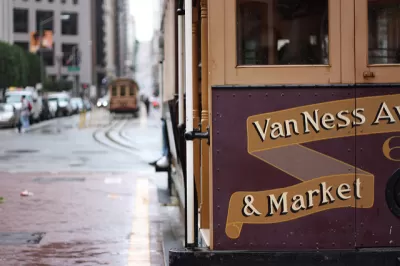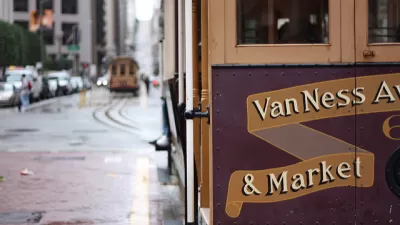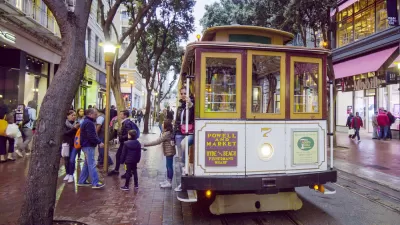The historic, car-free transformation of San Francisco's busiest street opens to the public today.

Mayor London Breed takes to the Internet today to announce the arrival of a whole new Market Street in San Francisco.
Starting today, over 2 miles of Market Street will become car-free, a historic milestone in the history of San Francisco and in the world-wide movement to create more spaces that are made for people.
According to Breed, Market Street is the busiest street in the city, and it's taken decades of politics and planning to complete this transformation. The final clearance for today's big reveal came in October 2019—the culmination of the Better Market Street process, which invested $604 million to improve the public realm for all users of the street.
Jeffrey Tumlin, the recently hired executive director of the San Francisco Municipal Transportation Agency, was on the scene this morning to reveal the new Market Street, and it almost looks like a scene in Europe.
Market St this morning pic.twitter.com/5z2GZI6P35
— Jeffrey Tumlin (@jeffreytumlin) January 29, 2020
The comments on a celebratory tweet from Mayor Breed, however, are typically American.
Starting today, San Francisco's main civic boulevard puts people first.
Market Street is officially car-free!https://t.co/lJbk8R2jMS— London Breed (@LondonBreed) January 29, 2020
FULL STORY: Making Market Street Car-Free

Planetizen Federal Action Tracker
A weekly monitor of how Trump’s orders and actions are impacting planners and planning in America.

Maui's Vacation Rental Debate Turns Ugly
Verbal attacks, misinformation campaigns and fistfights plague a high-stakes debate to convert thousands of vacation rentals into long-term housing.

San Francisco Suspends Traffic Calming Amidst Record Deaths
Citing “a challenging fiscal landscape,” the city will cease the program on the heels of 42 traffic deaths, including 24 pedestrians.

Defunct Pittsburgh Power Plant to Become Residential Tower
A decommissioned steam heat plant will be redeveloped into almost 100 affordable housing units.

Trump Prompts Restructuring of Transportation Research Board in “Unprecedented Overreach”
The TRB has eliminated more than half of its committees including those focused on climate, equity, and cities.

Amtrak Rolls Out New Orleans to Alabama “Mardi Gras” Train
The new service will operate morning and evening departures between Mobile and New Orleans.
Urban Design for Planners 1: Software Tools
This six-course series explores essential urban design concepts using open source software and equips planners with the tools they need to participate fully in the urban design process.
Planning for Universal Design
Learn the tools for implementing Universal Design in planning regulations.
Heyer Gruel & Associates PA
JM Goldson LLC
Custer County Colorado
City of Camden Redevelopment Agency
City of Astoria
Transportation Research & Education Center (TREC) at Portland State University
Jefferson Parish Government
Camden Redevelopment Agency
City of Claremont





























